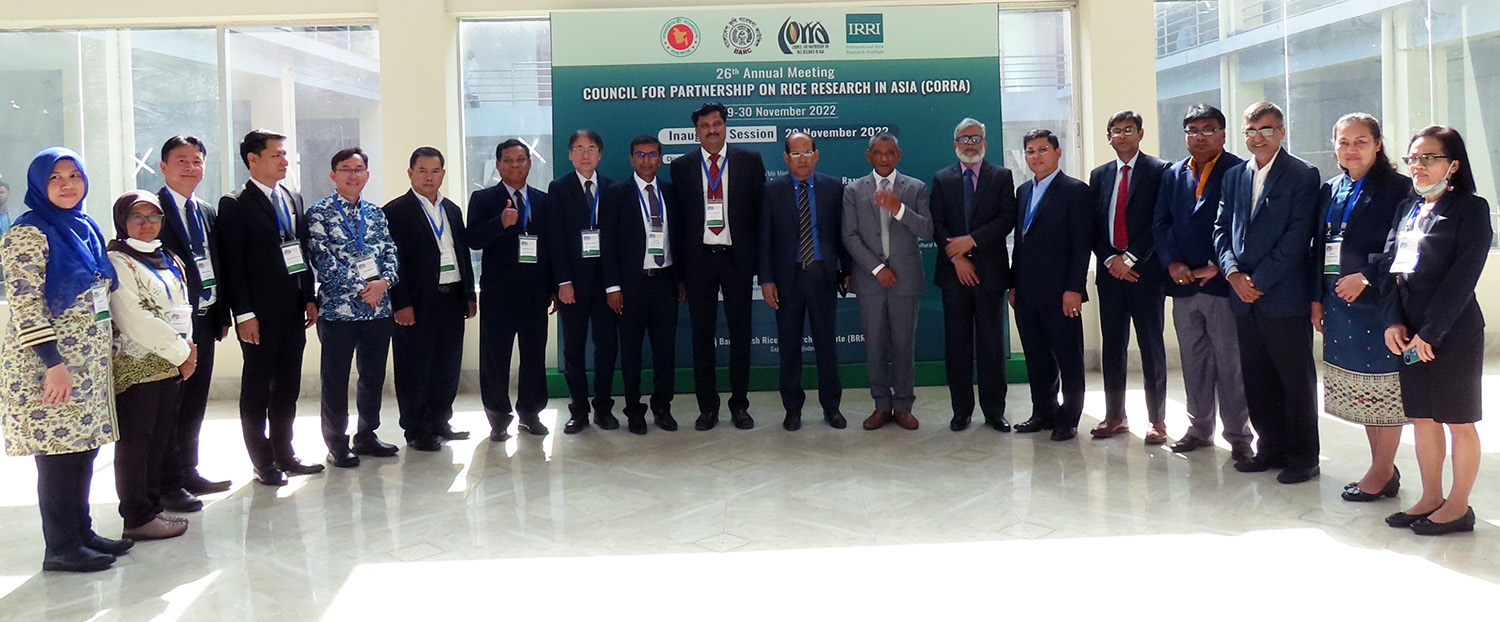26th Annual CORRA Meeting Highlights the Importance of Rice for Global Food Security

The annual meeting of IRRI, NARES partners and officials emphasized that strengthening the partnership among the network in rice-based agricultural research and development is key to addressing global agrifood challenges.
To strengthen the partnership among the agricultural researchers, research leaders, and extension workers in Asia, the International Rice Research institute (IRRI) in collaboration with Bangladesh Agricultural Research Council (BARC) held the 26th Annual Meeting for the Council of Partnership on Rice Research in Asia (CORRA) on November 29-30, 2022 in Dhaka, Bangladesh.
CORRA is composed of the leaders of IRRI and the National Agricultural Research and Extension Systems (NARES) of 16 rice growing countries in Asia including Bangladesh, Cambodia, China, India, Indonesia, Japan, Lao PDR, Malaysia, Myanmar, Nepal, Pakistan, Philippines, Republic of Korea, Sri Lanka, Thailand, and Vietnam. BARC represents Bangladesh.
During the two-day meeting, the members discussed the challenges being faced by the Asian and global rice industry, which include rising rice demand with growing population, food price inflation, scarcity of land and water, shortage of labor, rice yield gaps and yield stagnation, climate change, limited access to climate-smart technologies, inefficient value chains, impact of COVID-19, and Ukraine War on agrifood systems.

The meeting highlighted the importance of rice for global food security, and breaking the myths and misconceptions about production of rice such as the adverse effects on human nutrition and excessive usage of water. Members also had extensive discussions on the use of gene editing technology and the developing regulatory framework on gene editing. Participants also talked about low input agriculture, development of value-added rice products, sharing rice varieties between CORRA countries, and capacity development in rice research.
Mr. Md. Sayedul Islam, Secretary, Ministry of Agriculture, Government of the People’s Republic of Bangladesh was the chief guest at the inaugural session. He congratulated IRRI and BARC and said, “Meetings like these will enhance the mutual cooperation among the rice growing countries of Asia to achieve the shared goals of ensuring food security for the growing population across the globe. I hope that there will be continued support from IRRI for the rice growing Asian countries, including Bangladesh, especially on transforming the rice based agri-food systems.”
The meeting was chaired by Dr. Shaikh Mohammad Bokhtiar, Executive Chairman, BARC. Mr. Md. Ruhul Amin Talukder, Additional Secretary, Ministry of Agriculture, Government of Bangladesh was the Special Guest. The meeting was attended by senior officials from the 16 member countries. There were also representatives of various NARES institutions from Bangladesh present as observers.
Giving a brief overview of Bangladesh’s agricultural achievements, challenges, and importance of rice for food security, Dr Shaikh Mohammad Bokhtiar, said, “The CoRRA meeting gives an opportunity to share best rice farming practices and address challenges in rice production with other countries in the region thereby expanding our horizon of knowledge and learning.”
Dr. Nafees Meah, IRRI Representative for Asia and Dr. Md. Shahjahan Kabir, Director General of Bangladesh Rice Research Institute (BRRI) shared their perspectives on some of the discussions that took place over the two days. Dr. Jean Balié, Director General, IRRI joined the meeting online and spoke about the OneCGIAR transition for transforming land, water, and food systems for ensuring food security. Dr. Ajay Kohli, Deputy Director General for Research, IRRI too joined the meeting online to explain and share details of IRRI’s Research Flagship Areas.
In its declaration, the Dhaka Meeting directed CORRA to organize webinars on gene editing and low input agriculture.
The next CoRRA meeting in 2023 will be held in Indonesia. Among the topics to be discussed are the emerging challenges and solutions in the rice-based agrifood systems.